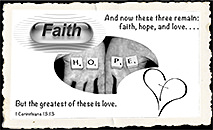First Corinthians 13:1–13 . . .
Love
In the thirteenth chapter of First Corinthians, Paul starts with a terse, enlightening teaching: That’s not love . . . this is love! It’s difficult, if not impossible, to believe that the Corinthians deliberately chose to abandon Christian love. Perhaps they were so focused on certain spiritual gifts that they unconsciously abandoned true love.
Paul’s approach to teaching us about love doesn’t instruct us about the importance of distinguishing between Greek words for love. Instead, he begins in vv. 1–3 (see this passage below) by showing that spiritual gifts have only minimal value, unless they’re exercised in love. In vv. 4–7, he doesn’t attempt to give us a technical definition of love; instead, he describes love in a way that clarifies what biblical love looks like; his description shows that the Corinthians had indeed lost their first love. If vv. 4–7 contrast true love with Corinthian conduct, vv. 8–13 contrast love with all spiritual gifts, showing that while all of the spiritual gifts are temporary, Christian love is eternal, outlasting faith and hope. If we join Paul at measuring the value of something by how long it lasts, we find that love comes out on top. After all, love is “the most excellent way” (see 12:31).
The importance of love in relation to spiritual gifts (13:1–3) The structure of vv. 1–3 is very clear, setting these three verses apart from the rest of the chapter. Each verse begins with an “if” clause, indicating that Paul speaks hypothetically. He seeks to demonstrate that any gift, exercised to its highest level of performance, is of greatly diminished value if that gift is exercised without love. He speaks in the first person: “If I . . . .” It seems safe to say that all of the gifts he mentions in these verses are gifts he actually possessed, likely surpassing the Corinthian believers. He writes of his own giftedness, pointing to the necessity of love for his gifts to be of benefit to others or to himself.
What love is like (vv. 4–7) Instead of giving a technical definition of love, Paul provides us with a description of love that’s especially pertinent to the Corinthians. In these four verses, we learn what love is like; we also learn that the Corinthians are seriously lacking in love. According to Paul, love is demonstrated by two general characteristics: (1) longsuffering in the face of adverse treatment by others and (2) kindness toward those who abuse us. Longsuffering outlasts ill treatment without resorting to retaliation, while kindness seeks to do good to those inclined to cause harm. That’s what love is like. In vv. 4b–6, Paul lets us know what love is not like. If these characteristics exist in Corinth — or in our church — we need to confess our lack of love.
1) Love is not jealous Jealousy is incompatible with love. Love seeks the benefit and well-being of another, so much so that a personal sacrifice is made to facilitate it. When others prosper from our efforts, this is precisely the essence of love. However, jealousy prospers at the expense of others. It was prevalent in the Corinthian church where believers were jealous of fellow-believers’ gifts and ministries.
2) Love is not arrogant and does not boast Arrogance and boasting aren’t Christian virtues; humility is a virtue. Arrogance and boasting are sinful responses to one’s prosperity. Arrogance (a.k.a. pride), which is a character trait of Satan, takes credit for your “success,” as though it was due to your own merit or superior efforts. Boasting is letting others know about your success in a way that suggests that others become jealous of that success.
3) Love does not behave badly The Corinthians weren’t behaving very well. There were divisions and factions. There was immorality, such that pagans were shocked (chapter 5). There were lawsuits (chapter 6). Some participated in heathen idol worship celebrations (chapters 8—10). Some Corinthians didn’t wait for others to join them before observing the Lord’s Supper (chapter 11). All in all, the Corinthians behaved badly. This isn’t love; love involves behaving in an appropriate manner.
4) Love is not self-centered (doesn’t seek its own) The Corinthians were completely self-absorbed; they measured themselves by their gifts and ministries; they didn’t think of themselves as a part of the body of Christ. They had marvelous “self-esteem,” but had disdain for Paul and the other apostles (see chapter 4). They’re so self-centered they’re willing to demand the freedom to practice their alleged liberties, even if it destroyed a weaker brother (chapter 8).
5) Love is not provoked This Greek term, rendered “provoked,” depicts provocation to anger. Paul uses the term to describe a short-fused person, easily and quickly provoked to take action that doesn’t edify either party. Love doesn’t “pop its cork,” “lose its cool,” “burn out its fuse,” or “have a chip on its shoulder, looking for a tiny offense so it can ventilate its anger and hostility.”
6) Love doesn’t keep a record of past offenses Paul’s next point is that love doesn’t, so to speak, go around with a little black book, making notes of every evil thing. Love keeps no score of wrongs, says Paul.
7) Love doesn’t rejoice in unrighteousness but rejoices with the truth Paul also says that love looks primarily to the truth of God’s Word — secondarily to truth in general — to define what it can enjoy.
Love never fails (vv. 8–13) Love “never fails” in the sense that it’s eternal. In other words, love doesn’t die or ever come to an end. In contrast to love, Apostle Paul declares that spiritual gifts do come to an end: they fail. He writes of the demise of the three spiritual gifts considered most valuable by the Corinthian believers. In v. 8, he insists that love must be superior to all spiritual gifts in terms of permanence. Value can be measured in terms of how long something lasts: love lasts forever; spiritual gifts don’t.
In vv. 9 and 10, Paul explains why spiritual gifts must be temporary. Then in vv. 11 and 12, using an analogy, he puts spiritual gifts into perspective and indicates how we should view them. And, in v. 12, Paul likens our perception of truth and reality to looking into a mirror (one made in his day), which only imperfectly reflects reality.
Paul goes one step further (v. 13), declaring that love isn’t only better than one or all of the spiritual gifts, it’s even greater than faith and hope. Because he doesn’t explain himself in his closing concept, we shouldn’t agonize over this statement. Instead, we’re to clearly understand that love isn’t something to look down upon as inferior to spiritual gifts and wisdom; rather, it’s something of great value.
Note: 1st Corinthians challenges believers to examine every aspect of their lives through the lens of the gospel. In chapters 11–14, Paul presents these four challenges:
Covering the head in worship (ch. 11) | Concerning spiritual gifts (ch. 12)
The supremacy of love (ch. 13) | Intelligibility in worship (ch. 14)
› Watch BibleProject’s superb animated video (2 minutes) that highlights Paul’s messages in these four chapters.
† Summary of 1 Corinthians 13:1–13
Today’s passage, often called the “Hymn of Love,” is a profound passage about the supreme importance of love in the Christian life. Here’s my summary of its key points:
• The Supremacy of Love
Paul begins by emphasizing that without love, even the most impressive spiritual gifts are meaningless. He states that speaking in tongues, prophetic powers, knowledge, faith, and sacrificial giving are all worthless if not accompanied by love (vv. 1–3).
• The Nature of Love
We first see Paul describing the characteristics of love (vv. 4–8):
† Patient and kind
† Not envious, boastful, arrogant, or rude
† Doesn’t insist on its own way
† Not irritable or resentful
† Doesn’t rejoice in wrongdoing, but rejoices in the truth
† Bears, believes, hopes, and endures all things
• The Permanence of Love
Next, Paul contrasts love with other spiritual gifts:
† Prophecies, tongues, and knowledge will eventually pass away.
† Love, however, will never end.
• Love and Maturity
Paul uses the metaphor of childhood and adulthood to illustrate spiritual maturity:
† Childish ways are put aside as one grows.
† In maturity, we will see and understand fully.
• Faith, Hope, and Love
The passage concludes by stating that faith, hope, and love abide, but the greatest of these is love (v. 13).
This chapter emphasizes love as the foundational virtue of Christian life. It surpasses all spiritual gifts and remains essential for true spiritual maturity. Clearly, it presents love not just as an emotion, but as an active force that shapes behavior and relationships within the Christian community.
- Q. 1 What motivates you to work in and for a ministry (vv. 1–3)? Do you minister with a heart of love?
- Q. 2 Would people describe you as a loving person (vv. 4–7)? Why or why not?
- Q. 3 Why is it so easy to lack endurance in love (v. 7)? How can you become a person known for perseverance in love?
1 Corinthians 13:1–13
New International Version (NIV)
[You can view it in a different version by clicking here; you can also listen to this chapter.]
13 If I speak in the tongues of men or of angels, but do not have love, I am only a resounding gong or a clanging cymbal. 2If I have the gift of prophecy and can fathom all mysteries and all knowledge, and if I have a faith that can move mountains, but do not have love, I am nothing. 3If I give all I possess to the poor and give over my body to hardship that I may boast, but do not have love, I gain nothing.
4Love is patient, love is kind. It does not envy, it does not boast, it is not proud. 5It does not dishonor others, it is not self-seeking, it is not easily angered, it keeps no record of wrongs. 6Love does not delight in evil but rejoices with the truth. 7It always protects, always trusts, always hopes, always perseveres.
8Love never fails. But where there are prophecies, they will cease; where there are tongues, they will be stilled; where there is knowledge, it will pass away. 9For we know in part and we prophesy in part, 10but when completeness comes, what is in part disappears. 11When I was a child, I talked like a child, I thought like a child, I reasoned like a child. When I became a man, I put the ways of childhood behind me. 12For now we see only a reflection as in a mirror; then we shall see face to face. Now I know in part; then I shall know fully, even as I am fully known.
13And now these three remain: faith, hope and love. But the greatest of these is love.



